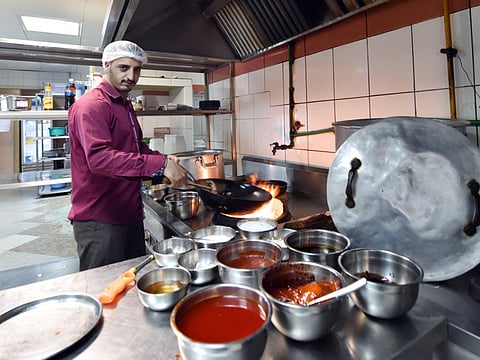It’s heart over matter, cooks who fast during Ramadan say
Cooks have found ways to cope with the challenges of fasting while doing their job

Dubai: The sight and smell of food can seem like torture to most people who are fasting. But not so for these cooks who bank on the business of food as their bread and butter even during Ramadan.
Eating and drinking in public is a punishable offence during Ramadan in the UAE. This is a way of paying respect to the traditions of the fasting month and to the faithful who observe it.
Non-Muslims can eat and drink in the confines of their homes. Workers in offices can do so in designated areas so as not to offend those who are fasting. But what if food is part of one’s job? How do Muslims cope when food cannot be kept out of sight?
Tunisian assistant cook Kais Gharbi said it could get challenging sometimes.
“It’s hard. But when I come to work, I forget about food and everything else until 7pm. That’s what keeps me going,” Gharbi, 26, who works at a shawarma joint, told Gulf News.
One block away from Gharbi’s joint is Mehmat Patlaz’s workplace. Patlaz was busy preparing Turkish dishes at the restaurant at around 2pm. The smell of freshly cooked traditional Turkish stew wafted in the air as he placed the tray on the counter.
“I encounter no problem at all working during Ramadan,” he said calmly.
“I’m used to it already. Anyway, I am doing this [fasting] for my God, not for me,” Patlaz, who has been a cook for 20 years, said.
“I can make out if the dish I’m cooking tastes good just by smelling it.”
For Mohammad Ashiq, following the recipe is crucial to cooking, especially since he can’t taste it during Ramadan.
“Fasting is my duty as a Muslim. I have reached a level where I don’t get tempted by food any more,” Ashiq, 25, said.
“When I see food during my fast, my heart is not into eating any more. It’s not mind over matter for me, but more like heart over matter.”
The long hours spent in the kitchen, mostly standing, and the heat trapped within the kitchen could be taxing to the human body that is abstaining from food or water for 15 hours a day.
“Cooking can be tiring. But for me, it has become normal. I can fast and I can cook. Alhamdulillah, all is OK,” Malaysian cook Ruzanna Razak, 29, who started fasting at age seven, said.
“When I feel extremely tired, I stop cooking, rest for half an hour, and then pray. After that, I feel refreshed and I start work again.”
Sign up for the Daily Briefing
Get the latest news and updates straight to your inbox



